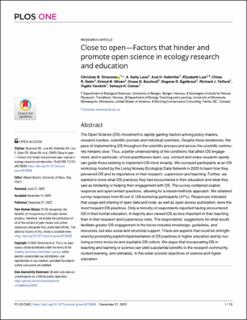Close to open—Factors that hinder and promote open science in ecology research and education
Strømme, Christian Bianchi; Lane, A. Kelly; Halbritter, Aud Helen; Law, Elizabeth; Nater, Chloé Rebecca; Nilsen, Erlend Birkeland; Boutouli, Grace D.; Egelkraut, Dagmar Dorothea; Telford, Richard James; Vandvik, Vigdis; Cotner, Sehoya Harris
Journal article, Peer reviewed
Published version

Åpne
Permanent lenke
https://hdl.handle.net/11250/3040859Utgivelsesdato
2022-12-21Metadata
Vis full innførselSamlinger
- Department of Biological Sciences [2216]
- Registrations from Cristin [9489]
Sammendrag
The Open Science (OS) movement is rapidly gaining traction among policy-makers, research funders, scientific journals and individual scientists. Despite these tendencies, the pace of implementing OS throughout the scientific process and across the scientific community remains slow. Thus, a better understanding of the conditions that affect OS engagement, and in particular, of how practitioners learn, use, conduct and share research openly can guide those seeking to implement OS more broadly. We surveyed participants at an OS workshop hosted by the Living Norway Ecological Data Network in 2020 to learn how they perceived OS and its importance in their research, supervision and teaching. Further, we wanted to know what OS practices they had encountered in their education and what they saw as hindering or helping their engagement with OS. The survey contained scaled response and open-ended questions, allowing for a mixed-methods approach. We obtained survey responses from 60 out of 128 workshop participants (47%). Responses indicated that usage and sharing of open data and code, as well as open access publication, were the most frequent OS practices. Only a minority of respondents reported having encountered OS in their formal education. A majority also viewed OS as less important in their teaching than in their research and supervisory roles. The respondents’ suggestions for what would facilitate greater OS engagement in the future included knowledge, guidelines, and resources, but also social and structural support. These are aspects that could be strengthened by promoting explicit implementation of OS practices in higher education and by nurturing a more inclusive and equitable OS culture. We argue that incorporating OS in teaching and learning of science can yield substantial benefits to the research community, student learning, and ultimately, to the wider societal objectives of science and higher education.
